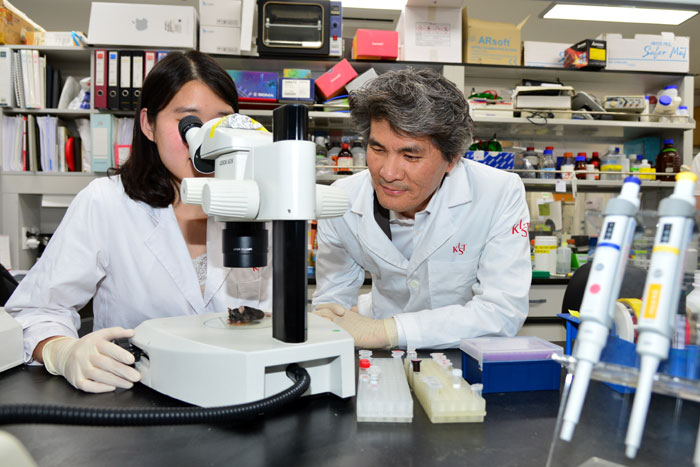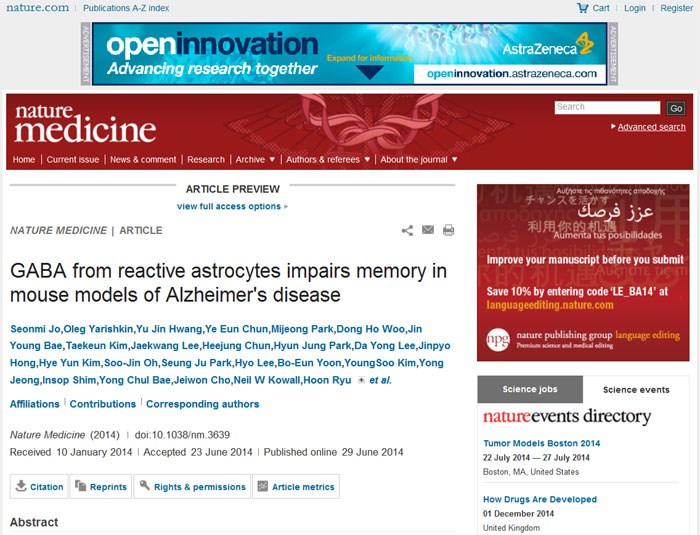-
 Korea.net's 24-hour YouTube channel
Korea.net's 24-hour YouTube channel- NEWS FOCUS
- ABOUT KOREA
- EVENTS
- RESOURCES
- GOVERNMENT
- ABOUT US
Alzheimer’s disease is an incurable disease that causes cognitive impairment by affecting the part of the brain responsible for memories. Patients who suffer from this disease will gradually forget everything, including the place they live and even their own names. In a world breakthrough, a group of Korean researchers have recently discovered the reason behind memory loss, raising the possibility of new treatment.
The research team, led by Dr. Changjoon Justin Lee at the Center for Neuroscience at the Korea Institute of Science and Technology (KIST), proved that reactive astrocytes inside the brain of Alzheimer patients produce GABA, or Gamma-Aminobutyric Acid, which causes memory impairment. In the past, memory loss was thought to be caused when brain cells got damaged or destroyed. Considering the fact that memory loss occurs in irregular ways, however, the team focused on the reactive astrocytes instead of nerve cells.

Reactive astrocytes are star-shaped cells that transport nutrition to neurons, a nerve cell in the brain. About 60 percent of reactive astrocytes account for the total cells in the human brain.
According to the researchers, reactive astrocytes release a lot of GABA by affecting an enzyme that removes dopamine from the hippocampus. Dopamine is a hormone that controls the brain's reward and pleasure center while the hippocampus is a major part of the brain that deals with memory. GABA disrupts the normal flow of information and causes memory loss by disrupting the path of neurotransmitters. This indicates that GABA is behind the removal of memory and not the damaged brain cells.
In the behavioral tests, the team used the fact that mice tend to prefer dark places. But a mouse that experiences an electric shock in a dark place will remember this event and avoid dark places from then on. A mouse with modeled Alzheimer’s disease cannot remember if such a shock was related to a dark place and keeps going back to it. The team demonstrated that treating these mice with a GABA inhibitor resulted in them not going back to the dark spot, thus showing evidence of memory recovery.
“The memory recovery is due to the inhibited release of GABA” said Dr. Lee. “From this study, we reveal the novel mechanism of how Alzheimer’s patients might lose their memory. We also propose new therapeutic targets, which include GABA production and release mechanisms in reactive astrocytes for treatment of Alzheimer’s disease.”
An international science journal “Nature Medicine” published the result titled “GABA from reactive astrocytes impairs memory in mouse models of Alzheimer disease” on June 30.

By Yoon Sojung
Korea.net Staff Writer
arete@korea.kr
The research team, led by Dr. Changjoon Justin Lee at the Center for Neuroscience at the Korea Institute of Science and Technology (KIST), proved that reactive astrocytes inside the brain of Alzheimer patients produce GABA, or Gamma-Aminobutyric Acid, which causes memory impairment. In the past, memory loss was thought to be caused when brain cells got damaged or destroyed. Considering the fact that memory loss occurs in irregular ways, however, the team focused on the reactive astrocytes instead of nerve cells.

Changjoon Justin Lee (right) at Korea Institute of Science and Technology (KIST) doing research. (photo courtesy of KIST)
Reactive astrocytes are star-shaped cells that transport nutrition to neurons, a nerve cell in the brain. About 60 percent of reactive astrocytes account for the total cells in the human brain.
According to the researchers, reactive astrocytes release a lot of GABA by affecting an enzyme that removes dopamine from the hippocampus. Dopamine is a hormone that controls the brain's reward and pleasure center while the hippocampus is a major part of the brain that deals with memory. GABA disrupts the normal flow of information and causes memory loss by disrupting the path of neurotransmitters. This indicates that GABA is behind the removal of memory and not the damaged brain cells.
In the behavioral tests, the team used the fact that mice tend to prefer dark places. But a mouse that experiences an electric shock in a dark place will remember this event and avoid dark places from then on. A mouse with modeled Alzheimer’s disease cannot remember if such a shock was related to a dark place and keeps going back to it. The team demonstrated that treating these mice with a GABA inhibitor resulted in them not going back to the dark spot, thus showing evidence of memory recovery.
“The memory recovery is due to the inhibited release of GABA” said Dr. Lee. “From this study, we reveal the novel mechanism of how Alzheimer’s patients might lose their memory. We also propose new therapeutic targets, which include GABA production and release mechanisms in reactive astrocytes for treatment of Alzheimer’s disease.”
An international science journal “Nature Medicine” published the result titled “GABA from reactive astrocytes impairs memory in mouse models of Alzheimer disease” on June 30.

A captured image of the homepage of Nature Medicine that introduces a new possible treatment for Alzheimer’s disease.
By Yoon Sojung
Korea.net Staff Writer
arete@korea.kr
Most popular
- First hearing-impaired K-pop act hopes for 'barrier-free world'
- Expats could account for 7% of population in 20 years: report
- 'Mad Max' director impressed by 'cinema-literate' Korean viewers
- Show in Italy to present 'thought-filled' Korean craftworks
- Romanian presidential couple visits national cemetery













